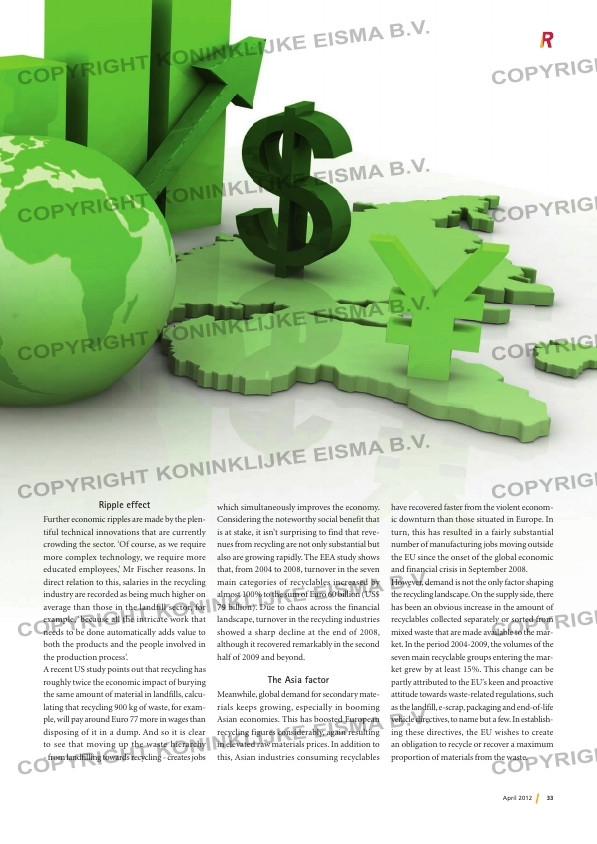Page 33 from: April 2012

33April 2012
which simultaneously improves the economy.
Considering the noteworthy social benefit that
is at stake, it isn’t surprising to find that reve-
nues from recycling are not only substantial but
also are growing rapidly. The EEA study shows
that, from 2004 to 2008, turnover in the seven
main categories of recyclables increased by
almost 100% to the sum of Euro 60 billion (US$
79 billion). Due to chaos across the financial
landscape, turnover in the recycling industries
showed a sharp decline at the end of 2008,
although it recovered remarkably in the second
half of 2009 and beyond.
The Asia factor
Meanwhile, global demand for secondary mate-
rials keeps growing, especially in booming
Asian economies. This has boosted European
recycling figures considerably, again resulting
in elevated raw materials prices. In addition to
this, Asian industries consuming recyclables
have recovered faster from the violent econom-
ic downturn than those situated in Europe. In
turn, this has resulted in a fairly substantial
number of manufacturing jobs moving outside
the EU since the onset of the global economic
and financial crisis in September 2008.
However, demand is not the only factor shaping
the recycling landscape. On the supply side, there
has been an obvious increase in the amount of
recyclables collected separately or sorted from
mixed waste that are made available to the mar-
ket. In the period 2004-2009, the volumes of the
seven main recyclable groups entering the mar-
ket grew by at least 15%. This change can be
partly attributed to the EU’s keen and proactive
attitude towards waste-related regulations, such
as the landfill, e-scrap, packaging and end-of-life
vehicle directives, to name but a few. In establish-
ing these directives, the EU wishes to create
an obligation to recycle or recover a maximum
proportion of materials from the waste.
Ripple effect
Further economic ripples are made by the plen-
tiful technical innovations that are currently
crowding the sector. ‘Of course, as we require
more complex technology, we require more
educated employees,’ Mr Fischer reasons. In
direct relation to this, salaries in the recycling
industry are recorded as being much higher on
average than those in the landfill sector, for
example, ‘because all the intricate work that
needs to be done automatically adds value to
both the products and the people involved in
the production process’.
A recent US study points out that recycling has
roughly twice the economic impact of burying
the same amount of material in landfills, calcu-
lating that recycling 900 kg of waste, for exam-
ple, will pay around Euro 77 more in wages than
disposing of it in a dump. And so it is clear
to see that moving up the waste hierarchy
– from landfilling towards recycling – creates jobs
32 – o 33 03-04-12 10:13



